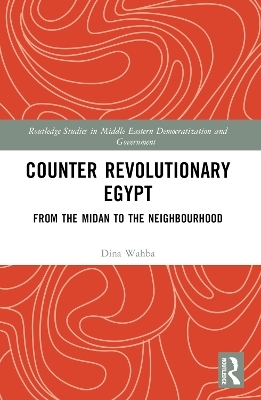
Counter Revolutionary Egypt
From the Midan to the Neighbourhood
Seiten
2024
Routledge (Verlag)
978-1-032-52853-3 (ISBN)
Routledge (Verlag)
978-1-032-52853-3 (ISBN)
- Lieferbar (Termin unbekannt)
- Versandkostenfrei
- Auch auf Rechnung
- Artikel merken
Focusing on the 25 January 2011 Egyptian revolution, this book traces its affective and emotional dynamics into the local realties and everyday politics of the urban subaltern, exploring the impact of revolutionary participation on protestors' engagement in street politics.
As well as investigating the affective dynamics of the revolution, the author analyses the spatiality of affect in the context of the Maspero Triangle neighbourhood, highlighting the disruption of the revolutionary moment and the evolution of informal political practices. In addition, the book focuses on state efforts to counter revolutionary street politics by co-opting and dismantling politicized local practices. It is argued that the appropriation by the state of the notion of the baltagi helped create narratives around 'thuggery' to undermine the politics of the urban poor. Based on empirical fieldwork, the book ultimately shows how the revolutionary moment informed subsequent local activism, illustrating that it was both disruptive and productive in terms of contentious street politics.
Combining literature on affect and emotion, intersectional gender and everyday politics, the book yields innovative and renewed insights within the fields of political science and Middle East studies, and will prove valuable reading for anyone interested in the Egyptian revolution and its aftermath.
As well as investigating the affective dynamics of the revolution, the author analyses the spatiality of affect in the context of the Maspero Triangle neighbourhood, highlighting the disruption of the revolutionary moment and the evolution of informal political practices. In addition, the book focuses on state efforts to counter revolutionary street politics by co-opting and dismantling politicized local practices. It is argued that the appropriation by the state of the notion of the baltagi helped create narratives around 'thuggery' to undermine the politics of the urban poor. Based on empirical fieldwork, the book ultimately shows how the revolutionary moment informed subsequent local activism, illustrating that it was both disruptive and productive in terms of contentious street politics.
Combining literature on affect and emotion, intersectional gender and everyday politics, the book yields innovative and renewed insights within the fields of political science and Middle East studies, and will prove valuable reading for anyone interested in the Egyptian revolution and its aftermath.
Dina Wahba is a Postdoctoral Researcher in the division of Public Sphere and Inequalities at the Communication Science Department, University of Salzburg, Austria. She received her PhD from Freie Universität, Berlin, where she worked as a research associate in the DFG-funded project Affective Societies.
1. Introduction 2. An Affective Register of the Revolution 3. Moving out of the Square: From the Midan to the Neighbourhood 4. Unravelling 'The People' and the (Re)making of Terrorist and Baltagi 5. Conclusion
| Erscheinungsdatum | 06.09.2023 |
|---|---|
| Reihe/Serie | Routledge Studies in Middle Eastern Democratization and Government |
| Verlagsort | London |
| Sprache | englisch |
| Maße | 156 x 234 mm |
| Themenwelt | Sozialwissenschaften ► Politik / Verwaltung |
| Sozialwissenschaften ► Soziologie ► Gender Studies | |
| Sozialwissenschaften ► Soziologie ► Spezielle Soziologien | |
| ISBN-10 | 1-032-52853-2 / 1032528532 |
| ISBN-13 | 978-1-032-52853-3 / 9781032528533 |
| Zustand | Neuware |
| Haben Sie eine Frage zum Produkt? |
Mehr entdecken
aus dem Bereich
aus dem Bereich
wie sich das weibliche Gehirn jetzt verändert und Sie diese neue …
Buch | Hardcover (2023)
Mosaik (Verlag)
CHF 36,90
eine kritische Theorie in 99 Fragmenten
Buch | Softcover (2023)
Campus (Verlag)
CHF 55,95


